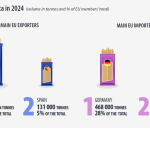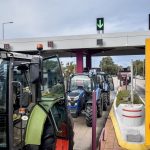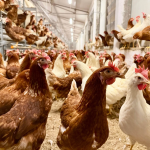Agro World News: Christophe Hansen to Agrocapital: “The new CAP must become truly simple and genuinely fair”

European Commissioner for Agriculture and Food Christophe Hansen grants an exclusive interview to Giorgos Bakolas Farmer & Journalist- , at a moment when the debate around the new CAP and the future of agricultural support is intensifying across Europe.
Before anything else, we would like to express our sincere gratitude. His presence in Greece is a great honor not only for us, but also for the entire farming community, which is closely watching the developments that will shape the future of agricultural production.
The Commissioner’s visit comes at a challenging time for Greek farmers, as market pressures, green transition requirements, and the impacts of natural events have heightened a sense of uncertainty in the rural landscape. In this context, the positions and signals coming from the European Commission carry particular weight, from the urgent need for genuine simplification to the strengthening of small and medium-sized farms.
With this backdrop, we initiate a direct and substantive conversation with Commissioner Hansen, seeking clear messages and concrete answers on the major challenges and strategic choices that will shape the future of European and Greek agriculture.
G. Bakolas:The new Common Agricultural Policy promises greater flexibility, simplification, and a shift from compliance to incentives. Yet, every reform wave has left behind layers of administrative complexity in the Member States. How will the Commission ensure that this time, “simplification” becomes a tangible reality rather than just a new vocabulary for an old system?
Christophe Hansen: You raise a very good point. There is a high administrative burden weighing on farmers’ shoulders, and on national administrations too. I am very aware of the problem.
Simplification is not only one of my personal priorities, but also a political priority of the European Commission.
I am pleased to announce that the European Parliament and the Council reached just this week an agreement on a package of simplification measures for the current CAP, that I presented in May. The current framework is in place since 2023 and we could already draw lessons from how it goes on the ground. It was necessary to get rid of certain complex rules and introduce more flexibility, especially for some environmental requirements. For example, there will now be only one on-the-spot control per year, and increased support for small farmers. Member States will also have a faster access to EU funding for farmers impacted by climate disasters.
The need to keep the policy simple is central to our proposals for the next Common Agricultural Policy, expected to start in 2028. We merge the first and the second pillar to streamline payment rules and remove the rigidities of committing to certain amount of spending in one or the other pillar. What is important is the result, the support to farmers’ income and to rural development. We also want to increase the scope of lump sum payments, which are simpler to manage for national administrations and require less forms from farmers.
The negotiations on the future CAP are only just starting now, and it will be a marathon, not a sprint. I will be very careful during the discussions to maintain the rules and legal framework as simple as possible.
G. Bakolas: Europe is striving to combine food security with environmental ambition. As farmers are asked to reduce emissions, adopt sustainable practices, and embrace digitalization, do you believe the transition is supported by adequate financial and technical instruments to prevent small farms from being left behind?
Christophe Hansen: Given the impacts of climate change with events that are becoming more frequent and extreme, our food production cannot flourish if it does not go hand in hand with the protection of our natural resources. Farmers deserve praise, as they are the first to suffer from the impact of climate change but are also key in fighting it. The agriculture sector has already reduced emissions and we need to recognise and support these efforts.
Our CAP supports the transition to sustainable agricultural practices to all farmers who want to or need support. Currently, 32% of the CAP funding is allocated to actions for the climate, water, soil, air, biodiversity and animal welfare. This represent €98 billion. In its CAP Strategic Plan, Greece decided to allocate more than €400 million per year to support eco-schemes, such as using resilient species and varieties, improving green cover practices and reinforcing biodiversity, circular economy and environmentally-friendly management practices. In the simplification package we just agreed upon, covering the current CAP, we also decided to exempt farms below 30 hectares of controls for certain practices.
I know that transitioning to certain practices has a cost and this is why I want to use more incentives in the next CAP, in the model of eco-schemes. Farmers who want to do more will also have access to more funding to help them cover part of the costs. And I want to move away from one-size-fits-all, prescriptive measures imposed top-down. We should not forget that farms in Finland, Ireland or Greece face very different realities.
If the requirements are more adapted to the local environment, they should hopefully be easier to comply with. Again, I never want to lose sight of simplification!
G. Bakolas: The new budget architecture places Europe in a landscape of growing geo-economic competition. In a world where trade partners pursue increasingly assertive agricultural strategies, how can the EU defend its environmental and quality standards without compromising competitiveness and market access?
Christophe Hansen: First of all, I think that Europe must not underestimate its strengths. We are the world’s biggest exporter of agri-food products. In 2024, EU agri food trade reached a surplus of 64 billion euros. This shows that our products are renowned and wanted across the world. Trade is important for our competitiveness but also for our farmers.
To secure our market access to world markets, but also to ensure a stable supply of essential inputs for our farmers, we need to diversify our trade relations. Within a year, we finished negotiating a trade deal with Ukraine, with Mexico, and with Mercosur countries. We are also progressing well with India.
Having trade agreements allows us to expect more from our partners in terms of reciprocity and alignment with our production standards. With the anti-deforestation rules, for example, we will ensure that agricultural products from Mercosur will not come from deforested areas. We also have rules banning the use of certain neonicotinoids, proved bad for the environment, especially bees.
With Ukraine, we went even further as they committed to align with all our production standards by 2028. This in view of their accession to the EU, of course.
I will keep pushing for a fairer competition. We will increase controls on imports, and the Commission will set rules to make sure that the products we import have not been grown using toxic pesticides forbidden in the EU.
This is an ongoing work, bilaterally with our partners, but also at multilateral level in international bodies.
I am also personally engaging in trade diplomacy to continue to promote our high-quality food worldwide. For example, I went to Brazil in October accompanied by a business delegation of 80 EU companies, including representatives of the olive oil, dairy and wine and spirits sectors of Greece.
G. Bakolas: The Commission has emphasized the importance of fair living and working conditions in rural areas, especially through the updated Rural Action Plan. As the EU moves towards a more sustainable and equitable future, how will the Commission balance the need for economic growth in rural areas with the protection of their cultural and environmental heritage, ensuring that development does not come at the expense of their uniqueness and sustainability?
Christophe Hansen: The Commission’s vision for rural areas is that economic growth and the preservation of cultural and environmental heritage must go hand in hand, not compete with each other. Through the Rural Action Plan, we are pursuing a model of growth with roots — one that builds on local strengths, traditions, and landscapes while improving living and working conditions.
We support rural economies that draw value from what makes them unique: sustainable farming, local food chains, agri-tourism, and the bio-economy. At the same time, we ensure that development remains fair and inclusive by promoting decent incomes, access to services, and opportunities for younger generations to stay and invest locally.
Sustainability is central to this balance. Farmers and rural communities are rewarded for environmentally friendly practices, innovation is encouraged where it respects biodiversity and heritage, and funding — through the CAP and cohesion instruments — is directed toward projects that strengthen rather than replace local identity. In short, our goal is to make rural areas vibrant and prosperous while ensuring that growth never comes at the expense of their culture, environment, or way of life.
G. Bakolas: One of the key objectives highlighted in the Commission’s vision is to create opportunities for young people in rural areas, encouraging them to pursue careers in agriculture. What specific steps is the Commission taking to ensure that agriculture becomes an attractive profession for the younger generation, and how does it plan to integrate innovation and entrepreneurship into this strategy to create sustainable agri-food businesses?
Christophe Hansen: Preparing the next generation of farmers is not a luxury, it is a necessity. In the EU, around 12% of farmers are below 40 years-old. In Greece, this share is even lower, at 7%. This puts our food security at risk. So, alongside simplification, making farming attractive for young people is one of my top priorities. We want agriculture to be seen not as something you inherit, but as a modern, innovative and rewarding career choice.
I presented in October my strategy for generational renewal in agriculture. In the next CAP, we will ask each Member State to prepare a national strategy for young farmers. And we will expect regular reporting on their progress. We will also expect Member States to dedicate at least 6% of its minimum CAP envelope to support young and new farmers.
The Commission will issue recommendations to lead the process and ensure a level-playing field. In the next CAP, young farmers will also benefit from a starter pack that will help them set up. It will include support for setting-up with lump sums of up to €300 000, investment aid, access to financial instruments, access to training and advice, with CAP co-funding. Farmers will have access to Erasmus for Young Entrepreneurs. They can go abroad and learn from another farm or even from an entirely different sector with a view to diversify their business. And we will co-fund the wages of replacement workers if farmers need to take a break because they are sick, need to take care of a relative or simply want to go on holiday. This is essential to improve their work-life balance.
But generational renewal is not driven by the CAP and the EU level alone. We must work at all levels, and across all policies to make a difference. To encourage young people to stay or settle in rural areas, we must enhance living conditions. This means prioritising infrastructure, such as healthcare, education, and, critically, high-speed internet. Making rural areas more appealing to young families is an essential part of securing our agricultural future.

As our conversation with Commissioner Christophe Hansen comes to an end, one message stands out with unmistakable clarity
Europe’s agricultural future will not be shaped in meeting rooms alone, but in the real fields, by real farmers, facing real pressures every single day.
The path ahead —simplification, competitiveness, sustainability, and generational renewal— is neither easy nor guaranteed. Yet the Commissioner’s commitment to engage directly, to listen, and to confront the structural challenges of the CAP offers a sense of direction at a moment when uncertainty weighs heavily on Europe’s rural communities.
For Greece, where farmers carry the weight of climate shocks, rising production costs, administrative burdens, and demographic decline, this dialogue is more than a policy exchange.
It is a recognition of their struggle — and an acknowledgment that their voice matters in Brussels.
Agrocapital will continue to follow these developments closely, amplifying the perspectives of those who live the reality of agriculture every day, and ensuring that their concerns remain not just heard, but understood.
Ακολουθήστε το Agrocapital.gr στο Google News και μάθετε πρώτοι τις ειδήσεις
Οι απόψεις που εκφράζονται στα σχόλια των άρθρων δεν απηχούν κατ’ ανάγκη τις απόψεις της ιστοσελίδας μας, το οποίο ως εκ τούτου δεν φέρει καμία ευθύνη. Για τα άρθρα που αναδημοσιεύονται εδώ με πηγή, ουδεμία ευθύνη εκ του νόμου φέρουμε καθώς απηχούν αποκλειστικά τις απόψεις των συντακτών τους και δεν δεσμεύουν καθ’ οιονδήποτε τρόπο την ιστοσελίδα.




